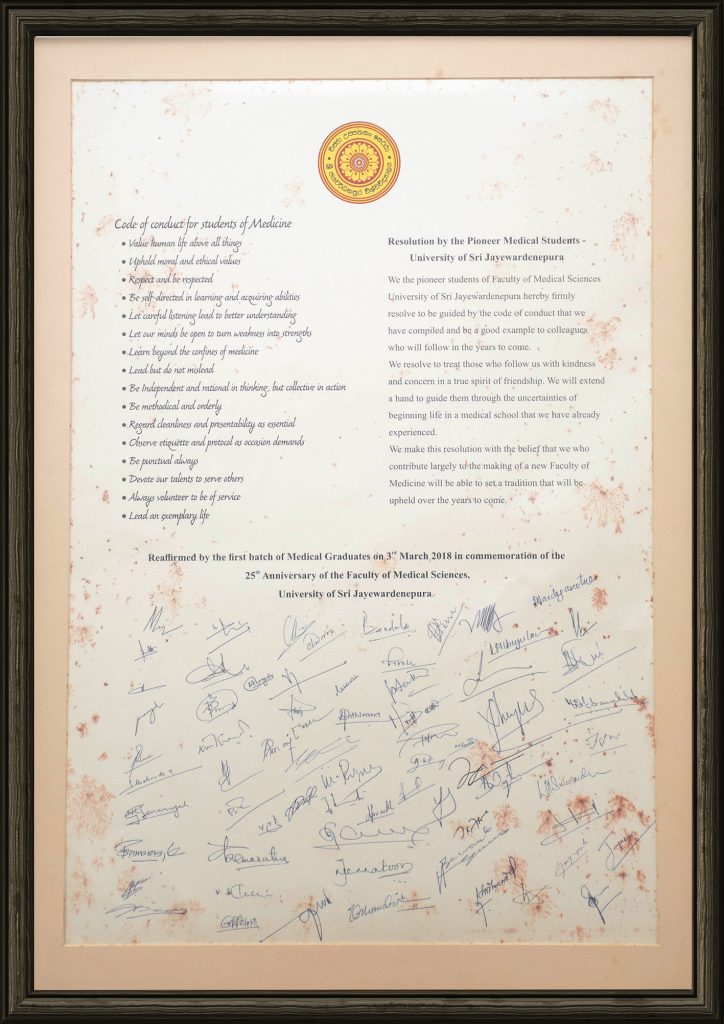Student Code of Conduct
On being admitted as a medical student to the Faculty of Medical Sciences, University of Sri Jayewardenepura I solemnly pledge that
I will,
- ensure that I am clearly identified as a student when dealing with patients, other healthcare professionals and the public at large and never pretend to be a qualified professional.
- be aware of and abide by the law of the land at all times.
- abide by the rules of the profession as stipulated by the Sri Lanka Medical Council (SLMC) and other authorities.
- not practice medicine unsupervised prior to obtaining full registration of SLMC.
- not abuse the special privileges that are bestowed upon me.
- dress appropriately to suit the occasion (refer to dress code).
- make personal hygiene and safety always a priority.
- be punctual.
- be honest at all times.
- lead a healthy life by example, by refraining from unhealthy lifestyle practices; e.g. smoking and drug abuse.
- follow the guidelines when communicating electronically, including via social media (refer Recommendation for using Social media and Electronic devices).
- give leadership to and/or participate in student activities in a lawful manner.
- be prepared to take different roles in a team.
- refrain from either indulging or abetting (explicitly or implicitly) in any form of ragging (physical, verbal or psychological) both in and out of the university premises.
- use with care the facilities and amenities provided by the university/hospital and hand them over to future students in good condition.
- help the authorities to keep the environment of the university (including hostels) and hospital clean.
- use extra-curricular activities for personal recreation and to build capacity in teamwork and leadership.
- prioritize learning and improving generic skills such as communication and information technology.
- be aware of the teaching and learning opportunities (i.e. teaching and learning methods) and resources available and take the maximum use of all such opportunities and resources.
- be responsible for my own learning and will prepare appropriately before attending teaching and learning sessions.
- uphold the highest standards and norms of research ethics and avoid plagiarism.
- always respect the patient’s feelings and ideas, and be compassionate.
- ensure that patient needs and safety comes first.
- take appropriate consent from the patient and or guardian before clinical examination.
- perform clinical skills on patients after practicing under simulated conditions as far as possible.
- perform clinical skills and procedures causing minimal discomfort and inconvenience to the patient.
- perform clinical skills while being sensitive to the patient’s social, cultural and religious contexts respecting patient’s rights and confidentiality.
- not discriminate patients based on their race, religion, gender, political beliefs or socio-economic background.
- perform clinical procedures only under appropriate supervision.
- seek every opportunity to provide accurate health-related advice to patients knowing my limits.
- handle all clinical documents and records with due caution maintaining confidentiality and consider that they are legal documents.
- follow appropriate ethical requirements when dealing with vulnerable individuals, minors and those lacking capacity.
- bring to the notice of the authorities any incapacity of mine, if it affects the health of the patients.
- respect all healthcare workers.
- never criticize another professional in an inappropriate forum.
- co-exist harmoniously with others of different ethnic, racial, religious, social and political backgrounds.
- respect the skills and contributions of other colleagues.
- never use abusive language to either members of the healthcare team or to patients.
- follow the appropriate norms when communicating with the staff at both university and clinical settings.
- be sensitive to the requirements of differently-abled persons, and where possible try to assist them.
- uphold the dignity of the profession at all times by not engaging in illegal or unethical activities.
- bring unethical practices to the notice of the authorities at all times.
History of the Code of Conduct
The pioneer batch enrolled to Faculty of Medical Sciences in 1993 was counselled in small groups to change behaviour and attitudes as punitive action against errant novices do not produce expected results. At the end of 20 sessions, the students were asked to compile key terms on conduct as students of medicine. This was the humble beginning of the “Student Code of Conduct” which after discussion they expressed their intention to abide by. A declaration was drafted and signed.
- Value human life above all things.
- Uphold moral and ethical values.
- Respect and be respected.
- Be self-directed in learning acquiring abilities.
- Let careful listening lead to better understanding.
- Let our minds be open to turn weaknesses in to strengths.
- Learn beyond the confines of medicine.
- Lead, but do not mislead.
- Be independent and rational in thinking but collective in action.
- Be methodical and orderly.
- Regard cleanliness and presentability as essential.
- Observe etiquette and protocol as occasion demands.
- Be punctual always.
- Devote our talents to serve others.
- Always volunteer to be of service.
- Lead an exemplary life.
The original student code of conduct was compiled by the pioneer batch of medical students of the Faculty of Medical Sciences, University of Sri Jayewardenepura.

A compilation of a student code of conduct is encouraged and guided (as a personality and professional development stream activity) during the orientation program when every new batch enters the portals of the Faculty.
